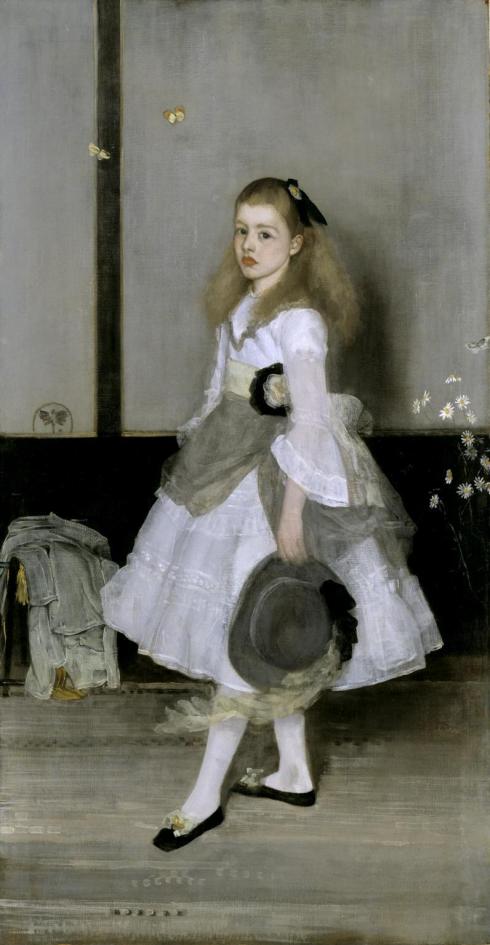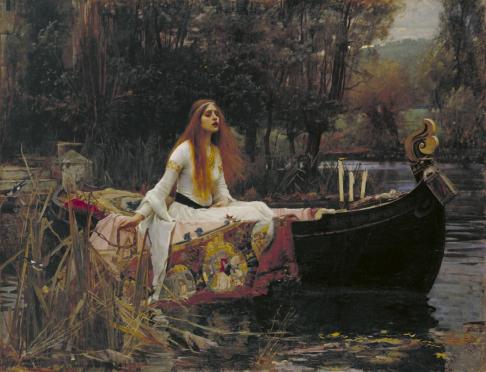“A fallen blossom
Returning to the branch?
It was a butterfly.”
(Moritake)
 James Abbott McNeill Whistler, Harmony in Grey and Green: Miss Cicely Alexander, 1872-1874
James Abbott McNeill Whistler, Harmony in Grey and Green: Miss Cicely Alexander, 1872-1874
Whistler painted quite a few ladies in white gowns, but those ladies usually have a look of melancholy or wistfulness on their gentle faces. The little girl appears to be showing off her clothes, her white stockings, her black satin slippers, her hat with a large feather, all the way to her dazzlingly white muslin gown, but as our gaze slowly moves up, we see a pale face with pouting lips and a distant gaze that doesn’t speak of joy or rapture. This little girl however looks rather moody, hiding her anger because she isn’t allowed to express it. But how can someone dressed in such a pretty gown be so moody? How can someone posing for an artist not have cheeks blushing from thrill and rapture? This dolly isn’t a typical melancholy muse as Joanna Hiffernan was; Whistler’s lover and companion who posed for his Symphony in White no 2 and some other paintings. This little girl is Miss Cicely Alexander, a daughter of a banker that Whistler met because of their mutual interest in Oriental art, and she was eight years old when this unfortunate sitting took place. More than one sitting naturally. It took the pedantic Whistler more than seventy sittings to paint everything just as he had envisioned it. He didn’t seem to take Miss Cicely’s feelings into consideration and despite the lyrical beauty of the portrait, it didn’t remain in good memory for the little girl. This is what she had to say about the sittings: “I’m afraid I rather considered that I was a victim all through the sittings, or rather standings, for he never let me change my position, and I believe I sometimes used to stand for hours at a time. I know I used to get very tired and cross, and often finished the day in tears.”
That’s why she looks moody! Why, wouldn’t you be moody and angry yourself, if you had to stand still for a long time and not be able to play with dolls or joke around with your friends or siblings. Sitting for Whistler surely made her feel like Sisyphus carrying that huge stone to the top of the hill over and over again; a never ending pursuit… which did have its ending after all. And the result is a very dreamy painting that continues Whistler’s tradition of portraits of wistful ladies inspired by Japonism. In this portrait, hints of Japan come in form of bright curious daisies on the right and a few butterflies that desperately want to escape the canvas. I really love how the tall daisies seem to be leaning towards the girl, as if they are trying to comfort her; “shhh little girl, don’t cry, that Mr Whistler may be awfully demanding but the painting will be a dream once finished”. The daisies are such prophets and they were right. Whistler’s eccentricity, love for l’art pour l’art philosophy and his pedantic approach to his art truly shine through in this portrait. He paid meticulous attention to all the aspects of the setting, especially the colours because he wanted to achieve a palette of muted shades, white and greys. The carpet and the walls are in many shades of grey while Miss Cicely shines in white like a resplendent white flower. The carpet was order made and that gorgeous muslin dress was designed by Whistler and made especially for Miss Cicely to wear in this portrait. He even made sure the family find the right muslin, as a dandy he would know the fabrics!
I really love all of Whistler’s harmonies and symphonies and their balanced colour palettes, dreamy ambients and pretty wistful sitters. For a long time my favourite was The Little White Girl, and perhaps it still is, but I feel that in this portrait Whistler achieved the minimalism of colours and space that he so loved in Japanese art; the background isn’t cluttered with fur carpets or fireplaces, it is just that meditative grey that stretches on and on, the mood of infinity broken only by that black line which somewhat reminds me of a canvas by Rothko, and the canvas is a little bit elongated which brings to mind the ukiyo-e prints and the formats they used. When I look at this portrait for a long time, at first I hear silence but then I hear quiet music emerging, an echo of the daisies’ laughter, and a sound of flute carried on by the butterflies chasing each other around the moody girl in white… Oh, how she wishes she could join them!





